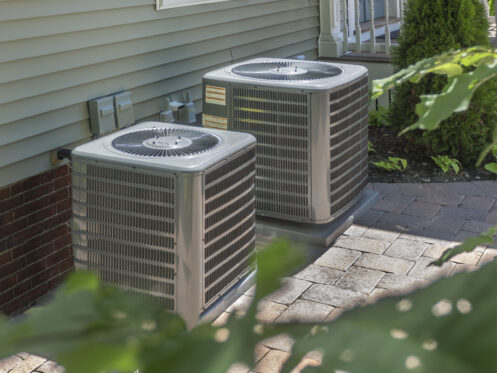
When building a new home, one of the essential aspects to consider is the heating, ventilation, and air conditioning (HVAC) units. The HVAC unit plays a major role in maintaining comfortable temperatures inside your home and will help improve its energy efficiency. It’s important for homeowners to make sure they select an HVAC unit that meets their needs and budget. Researching the different types of HVAC units available is essential for finding one that will be most suitable for your home. From choosing the right size and type of unit to considering installation costs, here is what you should know when selecting HVAC units for your new home.
1. Measure Your Home’s Size
The size of your home is the most important factor in determining which HVAC system is right for you. Heating or cooling a larger space requires more BTUs (British Thermal Units) than a smaller one will, so it’s essential to accurately measure your house’s square footage, including all living spaces.
To do this, measure the length and width of each room to get a good estimate of your total square footage. Once you have this information, finding an HVAC unit that is powerful enough to meet your heating and cooling needs will be easier. Additionally, be sure to note any special requirements for rooms that may require more powerful cooling or heating due to the presence of large windows, an attached garage, and other factors.
2. Consider the Type of HVAC Unit
There are a few different types of HVAC systems available, and each has its own advantages and disadvantages. The first option is a split system, which uses two components to provide heating and cooling. The main unit is placed outside the house and circulates air through ductwork inside the home. Split systems are great for larger homes since they’re powerful enough to heat or cool multiple rooms simultaneously.
The second type of HVAC system is a ductless mini-split, which is ideal for smaller houses. This type of unit also has two components but doesn’t require any ductwork to be installed. Instead, the air handler is placed indoors and connects to an outdoor condensing unit through pipes. Ductless systems are more energy-efficient than traditional split systems and can provide heating and cooling.
3. Consider Your Budget
The cost of an HVAC system can vary greatly, so it’s important to have a budget in mind before you start shopping. The more powerful and energy-efficient the unit is, the more expensive it will be. Additionally, installation costs should be considered when selecting an HVAC system for your new home. It’s a good idea to get quotes from several contractors before making your decision.
Also, be sure to factor in the cost of any additional components that may be needed for your system, such as air filters, ductwork, and thermostats. An accurate budget will make it easier to find an HVAC unit that meets your needs and financial capabilities.
4. Look for Energy-Efficient Models
When selecting an HVAC unit, looking for models with a high energy-efficiency rating is important. Doing so will ensure you get the most bang for your buck and can help reduce your energy costs over time.
To determine an HVAC’s efficiency, look for its Energy Star rating, which measures the unit’s ability to convert energy efficiently into cooling or heating power. The higher the rating, the more efficient it is, and your bills will be lower in the long run.
Additionally, be sure to look for any rebates or incentives that may be available from local utility companies that can help you save even more money on your purchases. When combined with an energy-efficient HVAC system, these incentives can provide significant savings over the life of your unit.
5. Think About Maintenance Requirements
As with any home appliance, regular maintenance is necessary to ensure that your HVAC unit works optimally. Different types of units will require different maintenance levels, so it’s important to factor that into your purchasing decision.
For example, ductless mini-split systems are relatively easy to maintain and don’t require as much cleaning as traditional split systems do. Additionally, they often come with remote access features that allow you to control the temperature anywhere in your home. On the other hand, split systems typically require more frequent maintenance and can be difficult to access if any repairs are needed.
6. Read Reviews and Ask for Recommendations
Reading reviews and asking for recommendations from people who have purchased similar HVAC systems is a great way to get an idea of which models may be best suited for your home. Additionally, you can contact local HVAC professionals or check out online forums to see what other homeowners are saying about different makes and models. Doing so can help narrow the selection and make finding an HVAC unit that meets your needs and budget easier.
When reading reviews, pay attention to any complaints that may be listed, as this can give you an idea of potential issues you might have with the system. Additionally, ask about the warranty coverage available from each manufacturer and any additional features that could help improve your home’s energy efficiency.
7. Make Sure You Get Professional Installation
Once you’ve chosen the right HVAC system for your home, it’s important to make sure that it is installed properly. Attempting to install it yourself could void any warranties and could even cause damage to your house if done incorrectly.
Instead, hire a professional HVAC contractor experienced in installing your chosen system. Be sure to inquire about any additional services they may offer, such as maintenance plans or discounts on parts and labor. For San Antonio residents and the surrounding areas, Beyer Air Conditioning & Heating provide quality installation and maintenance services for all types of HVAC systems.
8. Utilize Smart Technology
In the digital age, smart technology can make managing your home’s temperature easier and more efficient. Wi-Fi-enabled thermostats allow you to control the climate in each room from a smartphone or voice command device like Alexa. This eliminates the need for manual adjustments and can help conserve energy while saving you money on utility bills.
Smart HVAC systems can also be programmed to automatically adjust the temperature based on the time of day and occupancy. This ensures that your comfort level is maintained even when you’re not home and helps reduce energy waste.
9. Get Professional Advice
If you’re still unsure about which HVAC system to buy, don’t hesitate to get advice from a professional. An experienced heating and cooling contractor can provide valuable information and help guide you toward the best model for your home’s needs.
Getting professional advice is always recommended before making any major purchase, especially when it comes to HVAC systems. Having a knowledgeable contractor on your side can help you make the right choice and ensure that your system performs optimally for a long time.
10. Consider Quality Parts and Accessories
When selecting an HVAC system for your new home, it’s important to invest in quality parts and accessories that are designed for use with the model you’ve chosen. Low-quality components can not only reduce the performance of your unit but may also be hazardous if used incorrectly.
Be sure to look for high-quality parts designed to work with your system, such as air filters and thermostats. Quality accessories like these can help extend the life of your unit while also providing optimal performance.
Choosing an HVAC system for your home can be a hard task. Fortunately, by following the tips outlined above, you can make an educated decision and find a unit that meets your needs and budget. With some research, proper maintenance, and quality components, you should be able to keep your home comfortable all year round. Whether you’re in the market for a new unit or just looking to upgrade your current system, exploring all of your options can help you ensure you get the best HVAC system for your home. With some knowledge and planning, you can find a system that fits your needs and keeps your family comfortable for a long time.
At Beyer Air Conditioning & Heating, we provide services ranging from air duct cleaning, repairs, indoor air quality, HVAC repair, installation, and maintenance, among other services. Contact us today to speak to one of our qualified technicians and get started on your project.



